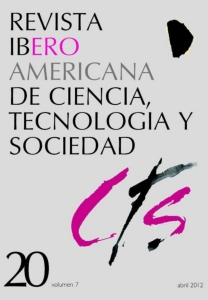Science, neoliberalism and the bioeconomy
DOI:
https://doi.org/10.52712/issn.1850-0013-687Keywords:
bioeconomy, biotechnology, neoliberalism, market, scienceAbstract
The bioeconomy is a project as well as a vision that stems from the neoliberal narrative of economic growth and competitiveness. It essentially makes reference to a new economy based on the technological manipulation, exploitation and appropriation of the living matter. This article aims to draw a map of the imaginaries and objectives of the bioeconomy through an analysis of the discourses elaborated by the EU and the OECD. It explores the relation between the bioeconomy as a narrative, with its public policy strategies and the neoliberal philosophy that underpins the latter. The bioeconomy emerges, thus, as a step further compared to the knowledge economy, in the neoliberal process oriented towards the extension of market-based ethics and practices to social and biological domains previously regulated in a different way. Turning to the cases of assisted reproduction and biopharming, this paper also shows the role of biotechnologies in the emergences, institutionalization and regulation of the bioeconomy. In its conclusion, it addresses some of the most challenging implications of a transition towards a bioeconomy, such as the process of de-politicization and restriction of access to natural resources that bioeconomies need to take off and consolidate.
Downloads
References
BARRY, A. y SLATER, D. (2002): “Introduction: the technological economy”, Economy and society,31, pp. 175-193.
BIRCH, K. (2006): “The neoliberal underpinnings of the bioeconomy: the ideological discourses and practices of economic competitiveness”, Genomics, Society and Policy,2, pp. 1-15.
BIRCH, K. (2007): “The virtual bioeconomy: the’failure’of performativity and the implications for bioeconomics”, Distinktion: Scandinavian Journal of Social Theory,14, pp. 83-99.
BIRCH, K., LEVIDOW, L. y PAPAIOANNOU, T. (2010): “Sustainable capital? The neoliberalization of nature and knowledge in the European ‘knowledge-based bio- economy’”, Sustainability,2, pp. 2898-2918.
BROCKINGTON, D. e IGOE, J. (2007): Neoliberal Conservation: ABrief Introduction.
CHILVERS, J. y BURGESS, J. (2008): “Power relations: the politics of risk and procedure in nuclear waste governance”, Environment and Planning A, 40, pp. 1881-1900.
COOPER, M. (2008): Life as surplus: Biotechnology and capitalism in the neoliberal era,University of Washington Pr.
EU COMMISSION (2002): Life Sciences and Biotechnology-a Strategy for Europe: Communication from the Commission to the European Parliament, the Council, the Economic and Social Committee and the Committee of the Regions,Office for Official Publications of the European Communities.
EU COMMISSION (2004): Towards a European knowledge-based bioeconomy, Luxemburgo, Office for Official Publications of the European Communities.
EU COMMISSION (2007): En route to the Knowledge-based Bio-economy,Bruselas, European Commission, 1-23l.
EU COMMISSION (2010): The Knowledge-based bio-economy (KBBE) in Europe: achievements and challenges, Bruselas, Flemish Government 1-68l.
GLEICHER, N., WEGHOFER, A. y BARAD, D. (2006): “A formal comparison of the practice of assisted reproductive technologies between Europe and the USA”, Human Reproduction,21, pp. 1945-1950.
HEDGECOE, A. (2004): The politics of personalised medicine: pharmacogenetics in the clinic,Cambridge University Pr.
HEDGECOE, A. y MARTIN, P. (2003): “The Drugs Don’t Work”, Social Studies of Science,33, pp. 327-364.
HOPKINS, M. M., MARTIN, P. A., NIGHTINGALE, P., KRAFT, A. y MAHDI, S. (2007): “The myth of the biotech revolution: An assessment of technological, clinical and organisational change”, Research Policy,36, pp. 566-589.
IN, A. I. S. P. P. (2001): Fostering the Bioeconomic Revolution.
JASANOFF, S. (2004): States of knowledge: the co-production of science and social order, Psychology Press.
MACNAGHTEN, P., KEARNES, M. B. y WYNNE, B. (2005): “Nanotechnology, governance, and public deliberation: what role for the social sciences?”, Science communication,27, p. 268.
MEADOWS, D. H., MEADOWS, D. L., RANDERS, J., BEHRENS, W. W. y OF, R. C. (1972): The limits to growth,Universe books New York.
MIROWSKI, P. (1994): “A Visible Hand in the Marketplace of Ideas: Precision Measurement as Arbitage”, Science in Context,7, pp. 563-589.
MIROWSKI, P. (2011): Science-mart: privatizing American science,Harvard University Press.
MIROWSKI, P. y PLEHWE, D. (2009): The road from Mont Pèlerin: the making of the neoliberal thought collective, Harvard Univ Press.
MITCHELL, R. y WALDBY, C. (2010): “National Biobanks: clinical labor, risk production, and the creation of biovalue”, Science, Technology & Human Values,35, p. 330.
NOVAS, C. (2006): “The political economy of hope: patients’ organizations, science and biovalue”, BioSocieties,1, p. 289.
OCDE (2006): Scoping document: The bioeconomy to 2030: Designing a policy agenda, París, OCDE, 382-286l.
OCDE (2009): The Bioeconomy to 2030: Designing a policy agenda,París, OCDE, 1- 18l.
PAVONE, V. y ARIAS, F. (2011): “Beyond the Geneticization Thesis: The Political Economy of PGD/PGS in Spain”, Science, Technology & Human Values.
SHEEHAN, P. y TEGART, G. (1998): Working for the future: technology and employment in the global knowledge economy,Victoria University Press for the Centre for Strategic Economic Studies.
WALDBY, C. (2002): “Stem cells, tissue cultures and the production of biovalue”, Health,6, p. 305.
WALDBY, C. y COOPER, M. (2010): “From reproductive work to regenerative labour”, Feminist Theory,11, pp. 3-22.
WALDBY, C. y MITCHELL, R. (2006): Tissue economies: Blood, organs, and cell lines in late capitalism,Duke University Press Books.
WRIGHT, V. C., CHANG, J., JENG, G., MACALUSO, M. y CENTERS FOR DISEASE CONTROL & PREVENTION (2008): “Assisted reproductive technology surveillance - United States, 2005”, MMWR. Surveillance summaries: Morbidity and mortality weekly report. Surveillance summaries / CDC,57, pp. 1-23.
Downloads
Published
How to Cite
Issue
Section
License
Copyright (c) 2024 CC Attribution 4.0

This work is licensed under a Creative Commons Attribution 4.0 International License.
All CTS's issues and academic articles are under a CC-BY license.
Since 2007, CTS has provided open and free access to all its contents, including the complete archive of its quarterly edition and the different products presented in its electronic platform. This decision is based on the belief that offering free access to published materials helps to build a greater and better exchange of knowledge.
In turn, for the quarterly edition, CTS allows institutional and thematic repositories, as well as personal web pages, to self-archive articles in their post-print or editorial version, immediately after the publication of the final version of each issue and under the condition that a link to the original source will be incorporated into the self-archive.











